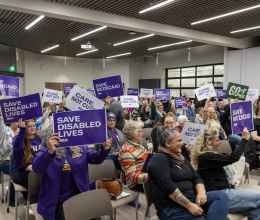
DENVER – Federal District Court Judge Marcia Krieger heard evidence from the ACLU of Colorado and the city of Colorado Springs on the city’s newly adopted “no solicitation zone” ordinance covering 12 city blocks of that city’s downtown area. The ACLU of Colorado had challenged the constitutionality of the ordinance under the First Amendment’s protection of free speech. Judge Krieger announced she will issue an oral ruling on Tuesday, December 18th at 4:00 p.m., one day before the ordinance is slated to go into effect.
“We argued that the charities, musicians and others we are representing in the lawsuit should be allowed to continue to exercise their First Amendment right to communicate with the public,” said Mark Silverstein, ACLU Legal Director. “We hope the Court agrees.”
After the Colorado Springs City Council passed the ordinance on November 27, 2012, the ACLU of Colorado filed the lawsuit on behalf of four organizations and four individuals, including:
- Greenpeace and Pike’s Peak Justice and Peace Commission (PPJPC), two nonprofit advocacy organizations that want to carry out outreach and fundraising activities downtown
- Star Bar Players, a nonprofit theater group that solicits pedestrians to buy tickets
- The Denver Voice, which seeks to protect its right to dispatch newspaper hawkers to the downtown area
- James Binder, a street musician who plays the flute on the downtown sidewalks
- Ronald Marshall, a disabled Colorado Springs resident who parks his wheelchair on a sidewalk corner while asking politely for spare change
- Laurel Elizabeth Clements Mosley and Roger Butts, who assert their right to receive the communications that the new ordinance will silence
“Instead of focusing narrowly on intrusive, menacing or coercive behaviors that invade the rights of others, Colorado Springs banned any and all forms of ‘solicitation’ in a 12-city block swath of downtown,” said Mark Silverstein, ACLU Legal Director. “We believe the city has unjustifiably transformed peaceful, non-threatening and constitutionally-protected communications into crimes – and the First Amendment does not allow such a overbroad suppression of expression.”
